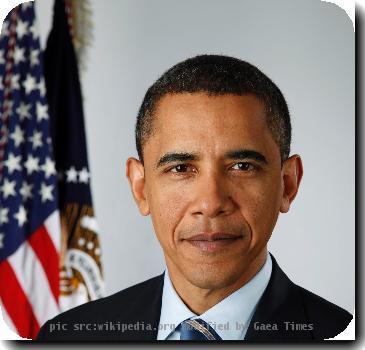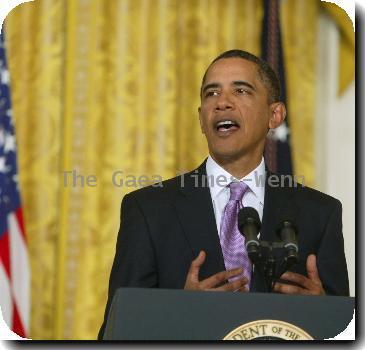US reinforces softer hand in relations with Afghanistan’s mercurial leader
By Deb Riechmann, APSaturday, April 10, 2010
US seeks to smooth relations with Afghan leader
KABUL — President Hamid Karzai got a VIP briefing at NATO headquarters and the top American diplomat in Kabul went out of his way to smooth U.S.-Afghan relations — signs that Washington is using a softer touch in dealing with the unpredictable Afghan leader.
The turnabout is a bid to ease the rancor of the past week that flared after Karzai, seeking to rally national support, accused the West of meddling in his nation. Karzai’s strident comments, just days after President Barack Obama visited Kabul, alleged the U.N. and the international community interfered in last year’s fraud-tarnished presidential election in Afghanistan.
Karzai’s backlash came at a time when 30,000 U.S. reinforcements are streaming into the country to ramp up the war against Taliban insurgents. The Obama administration needs Karzai’s support during an upcoming military offensive to clear the Taliban from Kandahar, the biggest city in southern Afghanistan and the Islamist movement’s birthplace.
“We occasionally have disagreements between us — of course we have disagreements between us occasionally — how can it be otherwise?” the U.S. ambassador to Afghanistan, Karl Eikenberry, said in a footnote to a news conference Saturday in the capital announcing $20 million in U.S. assistance to bolster local governance.
Across town at NATO headquarters, Karzai joked with U.S. Gen. Stanley McChrystal, the top NATO commander in Afghanistan, during a security briefing with senior military officials and members of the Afghan Cabinet. Karzai talked about his aspirations for a May conference to develop a national consensus for reaching peace with the Taliban, heard a security update on Kunduz province in northern Afghanistan and had lunch with top officials from the international coalition.
Tension between Karzai and the U.S. was running high even before Obama made his first presidential visit to Afghanistan.
En route to Kabul on March 28, Obama’s national security adviser, Gen. Jim Jones, told reporters that the White House needed to make the Afghan president understand that there are certain things that have not been paid attention to “almost since Day 1.” He cited Western pressure for Karzai to pick government officials based on credentials, not cronyism, battle corruption, and fight narcotrafficking, which helps to finance the insurgency.
In recent days, Jones changed his tone. He told reporters on Friday that U.S.-Afghan relations were on an “encouraging glide path.” He didn’t elaborate, but said that Karzai and Secretary of State Hillary Rodham Clinton had a “clarifying conversation” and perhaps it was time to calm the rhetoric in Kabul and Washington.
At Jones’ suggestion, Obama sent a thank-you letter to Karzai last week. He also told reporters that the White House had no intention of revoking Karzai’s invitation to visit Washington on May 12.
“I think this is really behind us now,” Jones said.
To make sure that journalists noticed the effort to soothe relations, the U.S. Embassy in Kabul e-mailed them a transcript of Jones’ Friday briefing in which he attempted to put the flap behind.
To reinforce that message, at the end of the news conference on local governance, Eikenberry read a statement about how the U.S. was 100 percent committed to helping make Afghanistan secure, stable and prosperous.
“Of course, we’re friends, we’re allies, partners and there’s going to be points of time when we have disagreements, and that’s how it is between good friends,” Eikenberry said. “But we’re going to continue to find ways to dialogue to get over those disagreements and keep moving forward for the long term.”
Karzai has long chafed under what he considers excessive international pressure. Those complaints escalated when he lashed out against the U.N. and the international community, accusing them of perpetrating a “vast fraud” in last year’s presidential polls as part of a conspiracy to deny him re-election or tarnish his victory — accusations the U.S. and the United Nations have denied.
A few days later, Karzai told a group of parliament members that if foreign interference in his government continues, the Taliban would become a legitimate resistance — one that he might even join, according to several lawmakers present.
Karzai associates have said the president considers Western complaints of corruption a smoke screen to discredit his government and draw attention from the fact that most of the billions in international aid have been spent and managed by foreign capitals themselves and not mismanaged by his government.
Finance Minister Omar Zakhilwal underscored that frustration at the news conference and said he was pleased that the U.S. support being pledged to help bolster governance in the 364 districts of Afghanistan’s 34 provinces would be channeled through the government.
“The money should be spent through the national budget of the Afghan government,” Zakhilwal said.
Tags: Afghanistan, As-afghanistan, Asia, Barack Obama, Central Asia, District Of Columbia, Kabul, Municipal Governments, North America, United States




